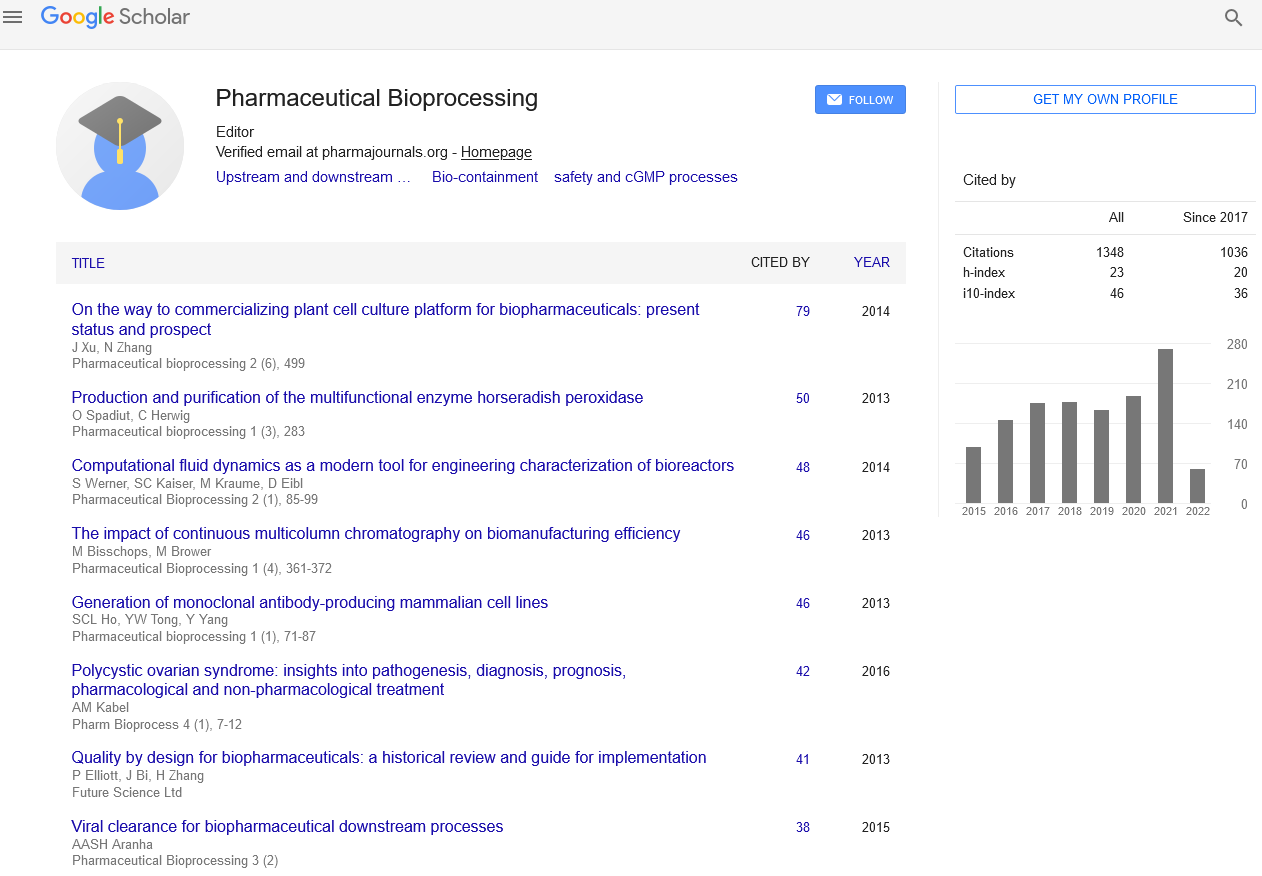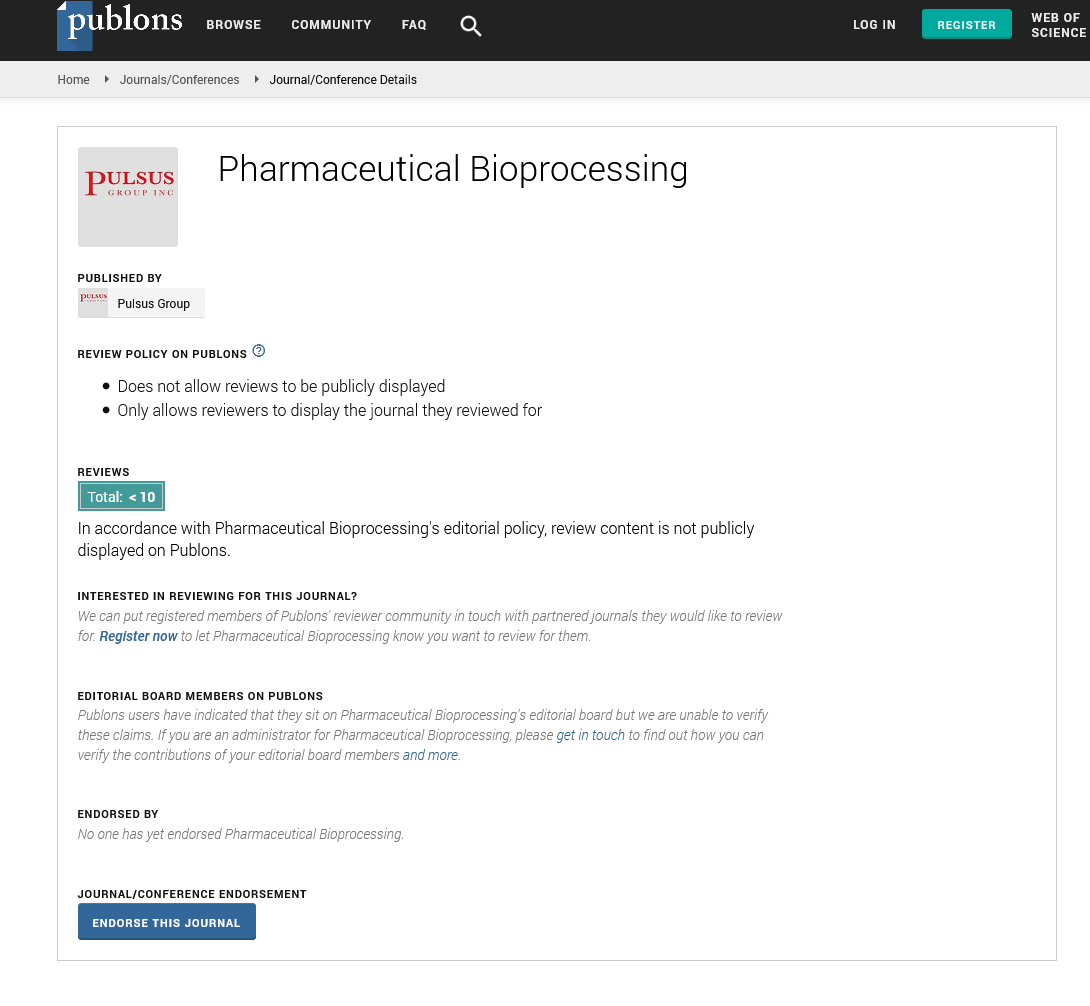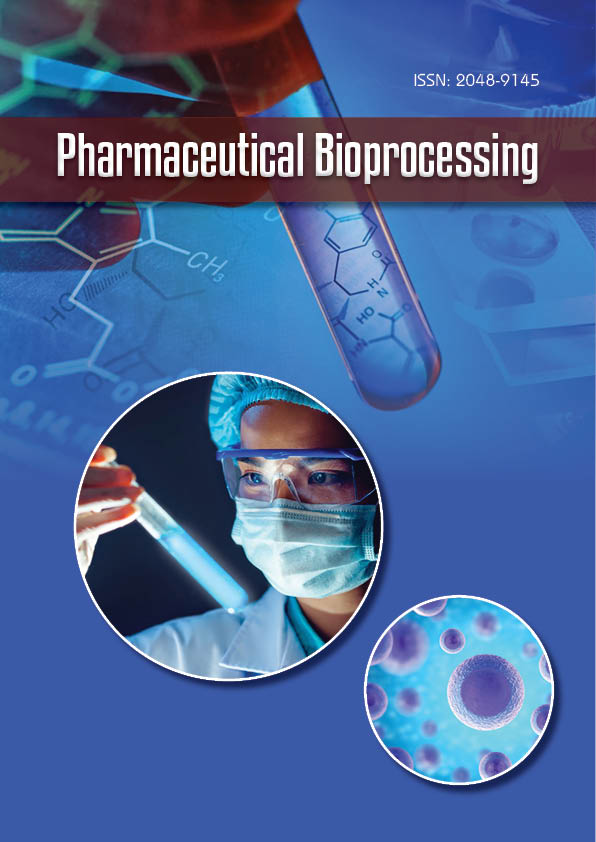Perspective - Pharmaceutical Bioprocessing (2023) Volume 11, Issue 5
Drug Manufacturing: Transforming Healthcare through Innovation
- Corresponding Author:
- Mark Cornell Manning
Department of Chemistry,
Colorado University,
Fort Collins,
USA
E-mail: Maning@LegacyBioDesign.com
Received: 15-Sep-2023, Manuscript No. FMPB-23-118610; Editor assigned: 20-Sep-2023, PreQC No. FMPB-23-118610 (PQ); Reviewed: 04-Oct-2023, QC No. FMPB-23-118610; Revised: 19-Oct-2023, Manuscript No. FMPB-23-118610 (R); Published: 27-Oct-2023, DOI: 10.37532/2048-9145.2023.11(5).106-107
Introduction
Drug manufacturing stands at the heart of healthcare, providing the means to transform scientific discoveries into life-saving medications. This intricate process involves a myriad of steps, from drug development and formulation to large-scale production and quality control. In this we will explore the captivating world of drug manufacturing, its significance, the evolving landscape of pharmaceuticals, the challenges it faces, and its role in shaping the future of healthcare.
Description
Significance of drug manufacturing
The significance of drug manufacturing in the healthcare industry cannot be overstated. It is the bridge between scientific discovery and the delivery of therapeutic solutions to patients. Here are some key aspects of its importance:
Advancing medicine: Drug manufacturing is the engine that transforms scientific breakthroughs into tangible medical treatments. Without the ability to mass-produce pharmaceuticals, many of the medical advancements we take for granted today would remain confined to the laboratory.
Life-saving impact: Pharmaceutical manufacturers produce a wide array of medications, from antibiotics that treat infections to oncology drugs that combat cancer. These medicines save lives, alleviate suffering and enhance the quality of life for millions of people around the world.
Innovation hub: The pharmaceutical industry is a hotbed of innovation. It continually pushes the boundaries of science and technology, exploring new compounds, formulations, and delivery mechanisms to improve drug efficacy and minimize side effects.
Economic growth: Drug manufacturing is a significant contributor to the global economy. It generates employment, fuels research and development, and supports ancillary industries, such as packaging and logistics.
Public health: Through mass production and distribution, pharmaceutical manufacturers play a vital role in improving public health. They provide the essential medications needed to control and manage various diseases and health conditions.
Evolving landscape of pharmaceuticals
The pharmaceutical industry has undergone substantial changes in recent years, fueled by scientific advancements, globalization and evolving consumer demands:
Biopharmaceuticals: Biologics, a class of medications derived from living organisms, have gained prominence. Biopharmaceuticals include monoclonal antibodies, vaccines, and gene therapies. These innovative treatments offer precision and effectiveness against complex diseases like cancer and rare genetic disorders.
Personalized medicine: Advances in genomics and molecular biology have enabled the development of personalized medicine. These treatments consider individual genetic and biological variations, leading to more effective and tailored therapies.
Digital health: The convergence of pharmaceuticals and digital technology has resulted in digital health solutions. These include smart pills, digital therapeutics, and data-driven approaches to drug development and patient care.
Globalization: Pharmaceutical manufacturing has become increasingly global, with Active Pharmaceutical Ingredient (API) production, formulation and distribution taking place across international borders. This globalization brings opportunities and challenges in ensuring product quality and security.
Regulatory changes: Regulatory authorities, such as the US Food and Drug Administration (FDA) and the European Medicines Agency (EMA), continue to adapt to the evolving pharmaceutical landscape. This includes fast-tracking approvals for breakthrough therapies and enhanced postmarket surveillance.
Challenges in drug manufacturing
While drug manufacturing holds immense potential, it is not without its challenges:
Regulatory compliance: The pharmaceutical industry operates under stringent regulatory frameworks. Manufacturers must adhere to Good Manufacturing Practices (GMP) and navigate complex and evolving regulatory requirements. Non-compliance can lead to product recalls and legal consequences.
Supply chain vulnerabilities: The global supply chain for pharmaceutical raw materials and finished products is susceptible to disruptions. This was evident during the COVID-19 pandemic, which exposed the fragility of the pharmaceutical supply chain.
Cost pressures: The cost of drug development and manufacturing is high, and the industry must balance the need for profitability with the goal of providing affordable medications to patients. The push for lower d rug prices a nd healthcare cost containment adds to these pressures.
Counterfeit medications: The pharmaceutical industry faces the challenge of counterfeit and substandard medications entering the market. These products not only pose health risks to patients but also damage the reputation of legitimate manufacturers.
Environmental impact: Pharmaceutical manufacturing can have environmental consequences, from water and air pollution to waste generation. Sustainability and eco-friendly practices are becoming increasingly important in the industry.
Future of drug manufacturing
The future of drug manufacturing promises exciting developments in several areas:
Advanced manufacturing technologies: The adoption of advanced manufacturing technologies, including continuous manufacturing, 3D printing and artificial intelligence, will enhance efficiency, reduce waste, and improve product quality.
Personalized medicine: The trend toward personalized medicine is expected to grow, with more treatments tailored to an individual’s genetic makeup and specific health conditions.
Biopharmaceuticals and biotechnology: The rise of biopharmaceuticals and gene therapies is poised to transform medicine, offering new treatment options for previously untreatable conditions.
Digitalization and data analytics: Data-driven approaches and digitalization will play a significant role in optimizing manufacturing processes, supply chain management, and quality control.
Green manufacturing: The industry is increasingly focused on sustainability and environmentally friendly practices to reduce its impact on the environment.
Conclusion
In conclusion, drug manufacturing stands as a cornerstone of modern healthcare, playing a vital role in the transformation of scientific discoveries into effective medical treatments. Despite the complexities and challenges it faces, the industry continues to innovate, adopting advanced manufacturing technologies, personalized medicine, and biopharmaceuticals to meet the healthcare needs of the 21st century. As the pharmaceutical landscape evolves, manufacturers must adapt, addressing emerging challenges while maintaining a strong commitment to product safety and efficacy. The future of drug manufacturing holds great promise, with the potential to drive advancements in science, improve patient outcomes, and contribute to a healthier and more prosperous world.


